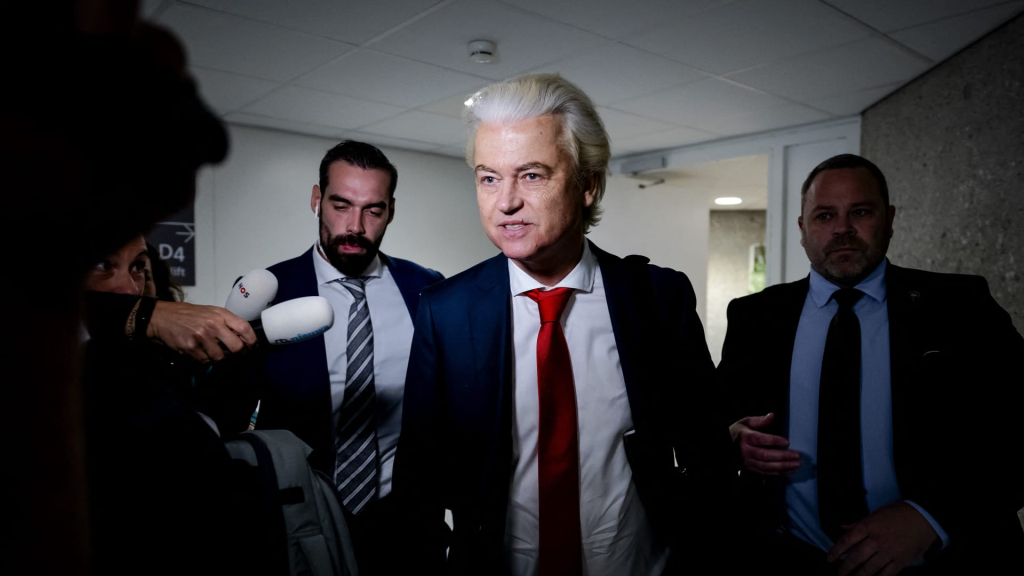The recent collapse of the Dutch government introduces a complex political scenario for the Netherlands, coinciding with preparations for the upcoming NATO summit in just three weeks.
Geert Wilders, the right-wing leader of the Party for Freedom (PVV), exited the government, marking a significant blow to the already tenuous Dutch coalition. His decision, announced Tuesday, stemmed from the failure of the three other coalition parties to address his ten-point proposal aimed at instituting stricter immigration measures after only 11 months in power.
Following Wilders’ announcement, Prime Minister Dick Schoof quickly resigned, setting the scene for potential snap elections.
The Netherlands, akin to other major European economies, has become increasingly polarized, with rising difficulties in achieving consensus on critical issues like immigration and housing. The latter has contributed to the downfall of two consecutive administrations, including the previous government led by Mark Rutte, which dissolved in 2023 due to similar issues.
According to Jess Middleton, a senior Europe analyst at Verisk Maplecroft, Wilders’ ultimatum underscored the absence of true collaboration within the coalition, a conflict that has persisted since its inception. Political instability appears set to continue in the foreseeable future.
Experts suggest that the imminent NATO summit and the expectation for the Dutch government to increase defense spending were also key factors influencing Wilders’ departure.
Strategic Position
NATO expects its member countries to commit to spending 5% of GDP on defense and security-related infrastructure by 2032, which will be a focal point of discussions during the summit on June 24-25.
Currently, no NATO member has achieved the 5% spending target advocated by former U.S. President Donald Trump or by Rutte, who now serves as NATO’s Secretary-General.
In the interim, Rutte proposed that alliance members aim for an increase to 3.5% of GDP, a goal that could cost the Netherlands an estimated additional 16 billion to 19 billion euros ($18.2 billion to $21.6 billion) annually.
Achieving this would require “either raising taxes or cutting spending,” remarked Jan Paternotte, a member of the centrist Democrats 66 (D66) party, during his appearance on Finance Newso’s “Squawk Box Europe” on Wednesday.
“It became clear that Mr. Wilders was inclined to do neither. Therefore, he chose to leave the coalition before facing these difficult decisions,” Paternotte added.
He continued, “Mr. Wilders wants to portray this as a fallout over immigration policy differences; however, it seems that he found the increasing pressure unbearable, leading him to exit as the Netherlands braces for substantial defense spending escalation.”
In a statement made while leaving the coalition, Wilders claimed he “had no choice” and emphasized his commitment to delivering the “strictest asylum policy ever,” which he felt he had been unable to realize. He also pointed to the strong support from voters, asserting that “millions” of Dutch citizens favored his plan to halt asylum applications.
He stated that “almost all aspects of the PVV asylum plan enjoy considerable backing from constituents across all coalition parties,” adding that nearly three-quarters of PVV supporters believed they should exit the cabinet if their proposals were not implemented.
Wilders found the kitchen too hot, so he found a way to get out of that kitchen, because the Netherlands was now facing the prospect of having to massively ramp up defense spending.Jan PaternotteMember of the D66 party
Recent polling data from EenVandaag indicates a sharp decline in voter confidence for the PVV party, plummeting from 37% last year to just 13% today. The survey, which included over 16,000 respondents, reveals that only one in ten voters reflects positively on the cabinet’s performance.
Armida van Rij, head of the Europe program at Chatham House, stated that Wilders likely saw the coalition’s dissolution as a strategic move, given the declining support for his party in the polls. “With the NATO Summit fast approaching, Wilders aimed to use this moment to press his coalition partners for negotiations, aware that a caretaker government would not present a strong image nor facilitate the advancement of important policies,” she noted in an email.
While current polls suggest that only the center-right VVD party may gain from new elections, the PVV is expected to remain significant in any resulting government structure.
Paternotte expressed skepticism about the possibility of a new coalition including the PVV, citing widespread sentiments among many center-left and centrist parties, including his own, that they would refuse to collaborate with Wilders.
After submitting his resignation, Schoof indicated that he and the other three coalition parties would assume a caretaker role, severely limiting their capacity to make policy decisions during a period characterized by rising geopolitical and trade tensions.
Paternotte acknowledged that the formation of a new government will be challenging, pointing to substantial cuts in education that have raised concerns within the business community.
“Personally, I view the government’s collapse as a positive development because it opens up fresh avenues for discussing critical topics with other parties… This is essential to ensure that the Netherlands strengthens its position within the European Union,” Paternotte stated.
– Finance Newso’s Holly Ellyat contributed to this report.


























